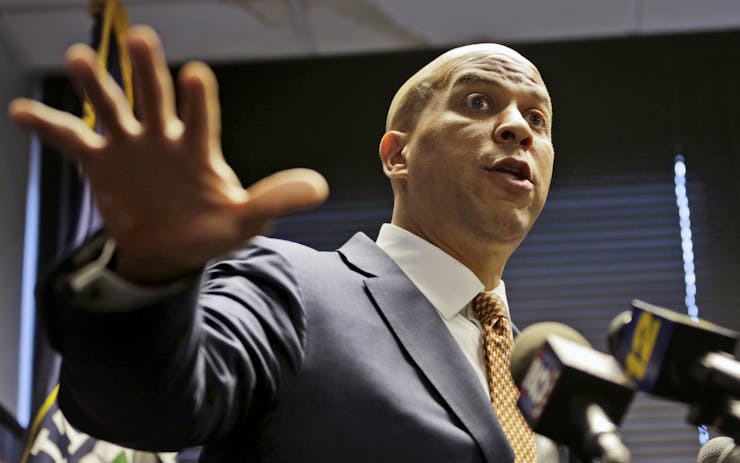Sen. Cory Booker (D-NJ) introduced legislation earlier today that would end federal cannabis prohibition and begin to repair some of the lasting damage done by the war on drugs.
'I believe the federal government should get out of the illegal marijuana business.'
“I believe the federal government should get out of the illegal marijuana business,” Booker said. “You see what’s happening around this country right now. Eight states and the District of Columbia have moved to legalize marijuana. And these states are seeing decreases in violent crime in their states. They’re seeing increases in revenue to their states. They’re seeing their police forces being able to focus on serious crime. They’re seeing positive things come out of that experience.”
Booker’s Marijuana Justice Act would:
- Remove marijuana from the Controlled Substances Act, ending federal prohibition of marijuana
- Cut federal funding for state law enforcement and prison construction if a state disproportionately arrests and/or incarcerates low-income individuals and/or people of color for marijuana offenses
- Allow entities to sue states that disproportionately arrest and/or incarcerate low-income individuals and/or people of color for marijuana offenses
- Prevent deportations of individuals for marijuana offenses
- Provide for a process of expungement for marijuana offenses at the federal level
- Provide for a process of resentencing for marijuana offenses at the federal level
- Create a “Community Reinvestment Fund” of $500 million to invest in communities most impacted by the war on drugs, for programs such as job training, reentry, community centers, and more. Part of the funding will come from the aforementioned cuts to state law enforcement and prison construction.
Not Just Legalization; Reparations Too
Booker’s proposal is especially strong on the social justice angle. “I have seen young teenagers getting arrested, saddled with criminal convictions for the rest of their lives,” Booker said during a Facebook Live event that followed the introduction of the bill. When a person is convicted of a felony marijuana charge, “they have to deal with about 40,000 collateral consequences. They can’t get business licenses, Pell Grants, public housing, food stamps.” Booker added that in some states, a person with a single marijuana conviction is barred from receiving a taxi license.
Here is Booker’s Facebook Live session earlier today:
“These marijuana arrests are targeting poor and minority communities,” Booker added, “they’re targeting our veterans. We see the injustice of it all.” When people of color are four times more likely to be arrested for marijuana possession than white people, when poor communities are targeted for marijuana enforcement while wealthy white people suffer none of the same oppression, Booker said, “you severely impact communities economically, you create crises in families, you hurt people’s long term economic potential.”
Booker mentioned his own experience observing the well-off enjoying cannabis with little or no risk of arrest. A similar dynamic happened during alcohol prohibition, he said. “If you were connected or elected, you could overcome alcohol prohibition. It’s the same thing now. I saw this at Stanford and Yale.” The privileged, he said, faced almost no threat from law enforcement.
The Marijuana Justice Act creates incentives for states to change their cannabis laws and stop enforcing existing laws in an unjust manner. It also includes mechanisms for people incarcerated for marijuana crimes to appeal to the courts to have their sentences reduced or eliminated. The bill also contains mechanisms for the expungement of past cannabis arrests and convictions.
“This bill creates a community reinvestment fund so that communities disproportionately affected by the unjust application of marijuana laws,” Booker said. “Those communities can apply for funds for job training, public libraries, community centers, and programs dedicated to youth.”
Moving From ‘Should’ to ‘How’
Drug reform advocates around the country applauded the introduction of the bill.
“The question is no longer ‘should we legalize marijuana?’; it is ‘how do we legalize marijuana?’ We must do so in a way that recognizes that the people who suffered most under prohibition are the same people who should benefit most under legalization,” said Queen Adesuyi, policy associate at the Drug Policy Alliance. “From disparate marijuana-related arrests and incarceration rates to deportations and justifications for police brutality – the war on drugs has had disparate harm on low-income communities and communities of color. It’s time to rectify that.”
NORML Executive Director Erik Altieri applauded the “robust legislation” for providing “a path forward for the individuals and communities that were most disproportionately targeted by our nation’s failed war on marijuana consumers.”
Booker is a longtime drug reform advocate who has been a primary co-sponsor of the CARERS Act (Compassionate Access, Research Expansion, and Respect States (CARERS), a bill focused largely on medical marijuana. The CARERS Act, which was re-introduced in June 2017, would provide federal protection to patients in states with medical cannabis programs, and expand cannabis research opportunities nationwide.
As of today, the bill has no co-sponsors. “This is one of those issues where it’s not about if we end the prohibition of marijuana,” Booker said. “It’s about when. Please help me make that time now.”
Leafly will continue to report this story as it develops today.





